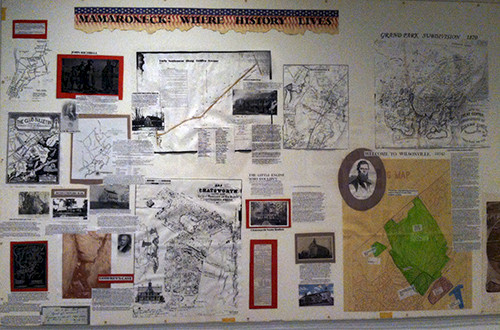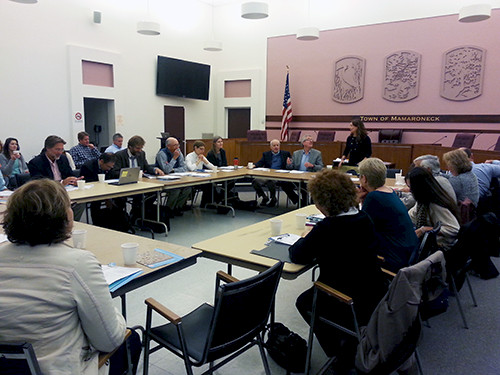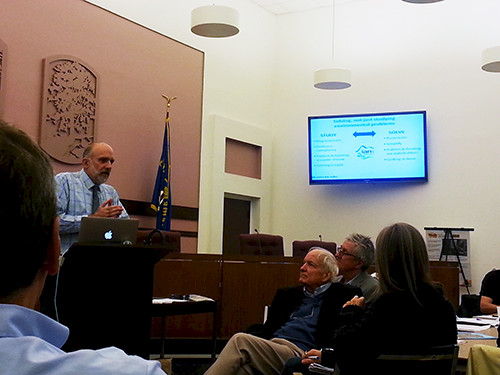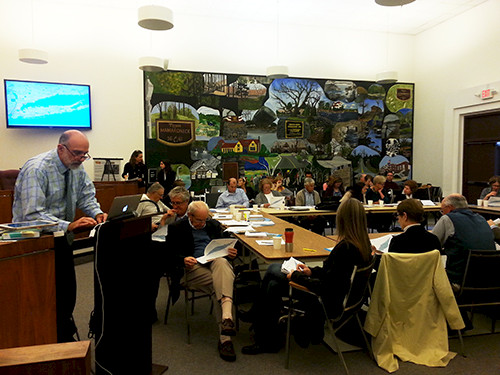Long Island Sound Report Card
Alexandra Fries ·On October 9th, Bill Dennison, Caroline Donovan, and I traveled to New Rochelle, New York, for a meeting on the Long Island Sound Report Card. The Long Island Sound Study includes two working groups, the Citizens Advisory Committee (CAC), and the Science and Technical Advisory Committee (STAC). These committees had a joint meeting on October 10th that we participated in, to further the progress of the Long Island Sound Report Card.
This meeting was held in the Town of Mamaroneck, New York, at the Town Center. Mamaroneck is a small town formed in 1788, with a storied history. The meeting occurred in the Town’s Court Room, a different but interesting venue than where we usually meet - complete with metal detector outside the door.


Bill Dennison led the meeting, and gave some background about what we do at IAN, as well as about environmental report cards.

We covered a wide variety of topics in the meeting, including the Long Island Sound's reporting region locations, conceptual diagrams, indicators, thresholds, and preliminary indicator scoring. Additionally, we discussed progress on the two embayment report cards, Hempstead Harbor, and Norwalk Harbor and River.

Originally there were 4 reporting regions designated. After further discussion, the narrows was split into two reporting regions to give a better delineation between different areas of Long Island Sound.

Additionally, we explored the products of the report card, and how best to release the report card to the public. Most people at the meeting indicated that they would like to have a large rollout of the report card, including press events in both New York and Connecticut, and perhaps even an event aboard a boat on the Long Island Sound itself.
At the end of the meeting, we gave out comment cards to all of the participants to fill out, similar to those used at the Mississippi River Report Card Summit earlier this month. Overall, we had a great, very productive meeting with the STAC and CAC groups in Mamaroneck. Next steps include compiling the comments we received, as well as finalizing the report card indicators, thresholds, and scoring. We are excited to see the report card evolve and develop over the next few months!
About the author
Alexandra Fries

Alexandra is a Program Manager at the Integration and Application Network (IAN) based at the University of Maryland Center for Environmental Science in Annapolis MD. Alexandra’s work in environmental management has been focused on assessment, monitoring, and management of aquatic, marine, and terrestrial ecosystems. Alexandra has extensive experience in data analysis, synthesis, mapping, interpretation, and communication. Alexandra has experience working with a diverse group of partners including those in local, state, and federal government, non-governmental organizations, non-profit organizations, private industry, and academia. Within IAN, Alexandra conducts data analysis, synthesis, and communication by completing environmental report cards, updating the IAN website, and conducting science communication courses. Alexandra also creates science communication materials such as diagrams, posters, presentations, newsletters, and reports using Adobe Creative Suite, Microsoft Office Suite, and ArcGIS. Alexandra has experience managing projects and staff on local and international projects, liaising directly with partners and colleagues, and providing insights on project direction and goals.